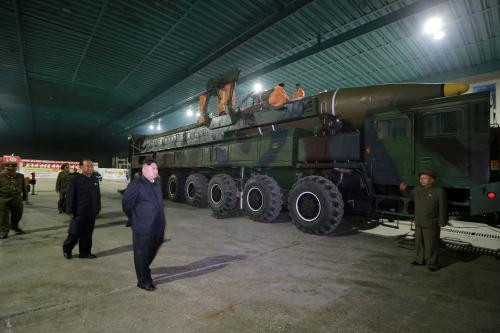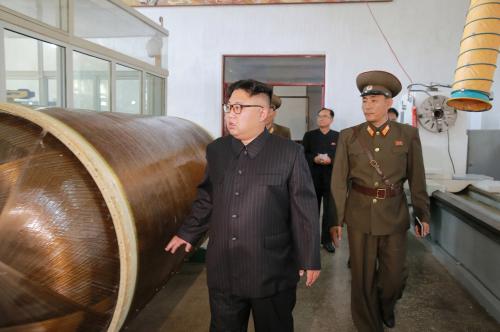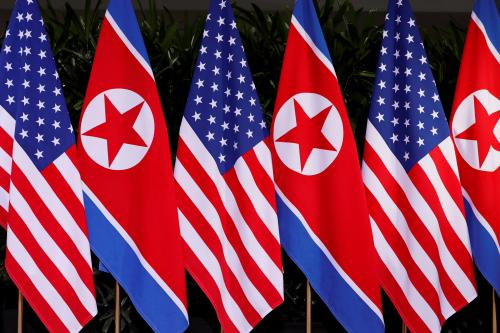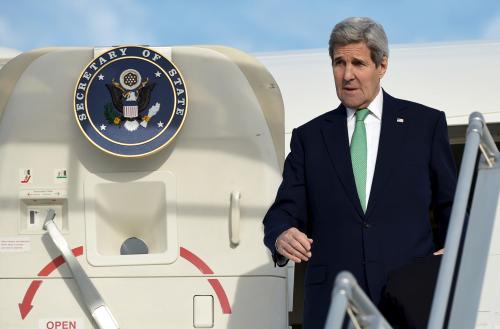Strengthening our alliances must be a central priority of U.S. strategy vis-à-vis North Korea, write Max Baucus and Ryan Hass. By the same token, international cooperation cannot meaningfully impact North Korea’s calculations unless the United States and China are pulling in the same direction. Our coordination with Beijing needs tending, they argue. This piece originally appeared on USA Today.
The Trump administration has made commendable progress in narrowing North Korea’s economic and diplomatic links to the outside world. However, the president’s attempts to outsource the North Korea problem to China are not the solution. Neither is his bluster, epitomized when he tweeted Sunday that his “wonderful” secretary of state was wasting his time trying to negotiate with “Little Rocket Man.”
We write from experience, having participated in numerous North Korea policy reviews and over a hundred hours of direct talks on the subject with top Chinese officials. These experiences gave us an understanding of what works and what does not. Rather than indulging in further threat wars with North Korea, the administration needs to concentrate on building domestic and international support for a realistic strategy. Until North Korea believes the United States is unified domestically and in lockstep with key partners internationally, it will continue on its present and dangerous course.
As a first step, the president needs to level with the American people about what vital interests the United States must protect. We believe the foremost priorities are to safeguard the U.S. homeland, uphold the credibility of our alliance commitments, prevent the proliferation of nuclear and missile technology, and avoid war. To best preserve these interests, the administration must build domestic support for hard-nosed diplomacy as a preferred alternative to the false choice between war and accommodation.
Greater domestic consensus on a plan for dealing with North Korea is sorely needed—including agreement between the president and his Cabinet, starting with Secretary of State Rex Tillerson. Ultimately, though, progress also will require tight coordination between Washington, Beijing, Seoul, Tokyo, and Moscow. These powers need to agree on shared objectives and the incentives and disincentives they are willing to pursue jointly to push North Korea toward those outcomes. Unfortunately, Trump’s recent threat to destroy North Korea in his United Nations address complicated this task.
Strengthening our alliances must be a central priority of our strategy. By the same token, international cooperation cannot meaningfully impact North Korea’s calculations unless the United States and China are pulling in the same direction.
Our coordination with Beijing needs tending. Beijing views the president’s threats to destroy North Korea or cut off trade with China as non-credible and counterproductive. This, in turn, feeds Beijing’s suspicions that Washington is not working toward peaceful denuclearization, but rather is using North Korea as a justification for strengthening security alliances, increasing military presence along China’s periphery, and installing regional missile defense systems to degrade China’s strategic position.
Beijing’s skepticism is compounded by its view that North Korea’s nuclear program is defensive in nature (i.e., to deter external attack), and that Kim Jong-un would not take the suicidal step of initiating conflict with the United States or its allies. These unresolved gaps between perceived intentions and threat assessments are hampering prospects for greater cooperation.
Washington has brought Beijing on board in the past. In spearheading the 2014 U.S.-China climate accord that led to the Paris Agreement, Washington worked intensively and quietly with Beijing to build consensus around a common objective, entered into give-and-take negotiations instead of unidirectional demands, and used a presidential visit as leverage to close the deal. Those lessons urgently need to be applied to the current situation with North Korea. We have to find a way to better align efforts with China. There simply is no other peaceful alternative. This will require much more creativity and diplomatic dexterity than has been evident to date.
To bring Chinese efforts into alignment with our own, Washington will need to convince Beijing that it respects China’s security interests on the Korean Peninsula. Working in tandem with Seoul, Washington could offer a U.S.-China-South Korea dialogue on contingency scenarios, where Washington and Seoul could address Chinese concerns about the future disposition of the Korean Peninsula. Washington and Seoul could jointly make clear that the alliance is not aimed at China, including by stating that as the missile threat from North Korea recedes, so too will missile defense systems in South Korea.
Likewise, as the overall threat from North Korea diminishes, the scale of U.S.-South Korea military exercises will be adjusted accordingly. Lastly, Washington could accept Beijing’s diagnosis that pressure alone is no solution, including by reaffirming its willingness to enter into dialogue with Pyongyang when progress appears possible and, in the interim, establishing a shared understanding of what conditions would enable diplomatic engagement. In return, Washington should drive a hard bargain in pushing Beijing to take specific, concrete steps.
We welcome Tillerson’s public acknowledgement that Washington maintains direct channels to communicate with Pyongyang. In order for efforts through those channels to deliver progress, Pyongyang will need to know that the United States is unified domestically and in lockstep internationally on a serious strategy for curtailing North Korea’s nuclear and missile ambitions and protecting the peace in Asia. Absent such unity of purpose, North Korea will stall for time and press for concessions as it advances its nuclear march.
The threat from North Korea is real. The time for name-calling has passed. The time for serious diplomacy is now.





Commentary
How climate negotiations are a model for boosting China’s assistance on North Korea
October 3, 2017